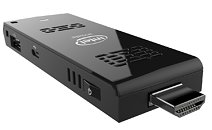Wednesday, April 22nd 2015

Intel Compute Stick Now Available
The Intel Compute Stick, a new pocket-sized computer based on a quad-core Intel Atom processor running Windows 8.1 with Bing, is available now through Intel Authorized Dealers for much of the world.
The Intel Compute Stick can transform any HDMI display into an entry computer capable of working with productivity apps, playing local or streamed content, driving basic digital signage or enabling thin clients. It will support Wireless 802.11 b/g/n, a microSD card for expandable memory, MicroUSB power supply and Bluetooth 4.0 for keyboard and mouse.The Windows version, available now, is expected to retail starting at $149. A Linux version with Ubuntu, available this summer, is expected to retail for $110.
Online etailers such as Amazon, Newegg, BestBuy, and others are expected to carry the product. More information can be found in our broadcast video gallery and on the Intel Compute Stick website.
The Intel Compute Stick can transform any HDMI display into an entry computer capable of working with productivity apps, playing local or streamed content, driving basic digital signage or enabling thin clients. It will support Wireless 802.11 b/g/n, a microSD card for expandable memory, MicroUSB power supply and Bluetooth 4.0 for keyboard and mouse.The Windows version, available now, is expected to retail starting at $149. A Linux version with Ubuntu, available this summer, is expected to retail for $110.
Online etailers such as Amazon, Newegg, BestBuy, and others are expected to carry the product. More information can be found in our broadcast video gallery and on the Intel Compute Stick website.


79 Comments on Intel Compute Stick Now Available
Performance per dollar isn't bad, judging by a review of a similar device running the same processor. The Zotac Zbox (Core i5 4200U) in the review goes for $480 and the Acer Veriton (Core i5-3337U) goes for $580. While both systems are more than twice as fast as the Compute Stick, they come at three and four times the price.
Edit: There's a really nice review by Gizmodo on this. Sounds like it's actually not all that great.
Also, Windows with Bing is a non-issue here, for $150 you get a FULL version of Windows, which is not a small thing, especially for companies that could buy them by the thousands.
My thoughts were Spartan was meant to be an all encompassing Browser, search engine etc.
In other words, Intel is ripping you off by charging any more than $1 for the Windows version over the Linux version.
I know this, because we use the Microsoft Technology Access Program to get $1 licenses for our low end portable machines.
Beats having to have my craptop busted asser hooked up behind my rca LCD TV for that.
You would be right if the Linux version would have the same specs as the Windows one, but it doesn't. It has only 1 GB of RAM and only 8 GB of storage.
Doesn't seem fair to pay almost double.
Personally I never use bing and never will.
Seems Intel didnt think it entirely trough.... TBH I see no point in getting it for any other reason than its size and portability. For streaming - my Chromecast does its job in 100%, paired with my Nexus5 and network NAS it cast or mirron anything I want for 30 euro total. If I need something powerful - I'd go for Gigabyte Brix, that is still much cheaper than Intel's device if you have spare parts around (SSD drive and RAM).
Why bother than?
-because Ubuntu version will be released in June, Windows version is available now
-Ubuntu version has 1GB memory and only 8GB eMMC memory, Windows version has 2GB memory and 32 GB eMMC
Personally I don't care what you use and what you never will. The fact is that you probably haven't even tried it and you are one of those moaners: ah Win 7 is so much better than Win 8.1 and I won't do an upgrade to Win 10 because I want to show the world how am I against MS.
Do yourself a favor use Bing for a week, I fucking dare you!
Same reason I cannot use DuckDuckGo, it is so limited and flunky when it comes to its search results, it's amazing people can actually advocate it.
But we are digressing, talking about Bing in a ComputeStick thread.
Some food for thought: Google's primary source of income is ad revenue. Microsoft's primary income is software revenue. Which company has higher stakes on the information you share with them? Who would you like handling your private data?This. Google currently is much more intuitive and user-friendly at the moment. Just a much more comprehensive package.